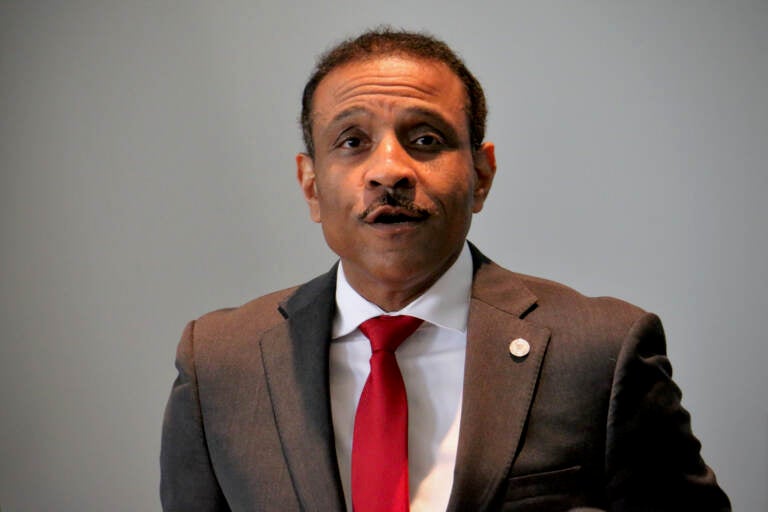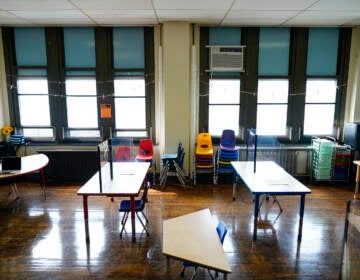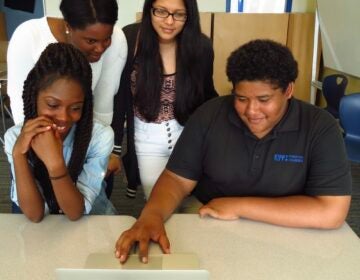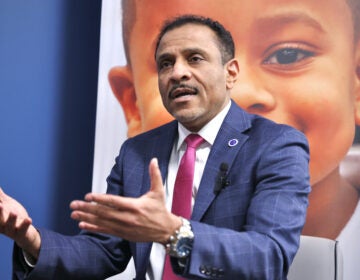Philly superintendent promises to end ineffective programs as part of strategic plan
Superintendent Tony Watlington said under his leadership, the district will practice “strategic abandonment” by rigorously assessing the success of individual programs.

File photo: School District of Philadelphia Superintendent Tony Watlington speaks at a press conference on August 12, 2022. (Emma Lee/WHYY)
The School District of Philadelphia lacks a clear “theory of action” when it comes to raising student achievement, according to a report from Superintendent Tony Watlington’s transition team.
“When initiatives are launched, they rarely go to scale as they come from separate departments in the central office and simply layer on initiative after initiative,” the report says.
Watlington said under his leadership, the district will practice “strategic abandonment” by rigorously assessing the success of individual programs.
“Things where the data shows it’s not making a difference we absolutely should stop doing it and do something different,” Watlington said at Thursday night’s school board meeting.
Watlington has repeatedly made clear that along with student safety, his top priority is improving academic performance. His ultimate goal is to make Philadelphia schools one of the “fastest-improving large urban school districts in the country.”
While student achievement for some grades increased by several percentage points under his predecessor William Hite, in general, proficiency rates have remained flat. Citywide, just 36% of district students meet state standards in reading and 22% in math.
Now that Watlington’s transition team report is complete — a 32-page document covering everything from operations to creating an anti-racist district culture — his next step is developing an “aggressive” five-year strategic plan.
Watlington said he’ll prioritize the report’s 91 short- and long-term recommendations as part of the planning process, which is expected to last until June.
While Watlington’s onboarding hasn’t attracted controversy as of late, things started out rocky when the board approved a $450,000 contract with a consulting firm in May to oversee the process.
The contract pays for three phases of work, the first two of which are already complete.
‘What about the kids now?’
Board members expressed support for Watlington’s work so far and for the upcoming strategic planning process, but also urged him to make more immediate changes.
“Five years out, that’s great for the kids not born yet,” said board member Lisa Salley. “What about the kids now?”
In response, Watlington pointed to his recent restructuring of the district’s leadership team. He said the addition of two deputy superintendents, Uri Monson for operations and Shavon Savage for academic services, will allow the district to operate more effectively.
He also highlighted four actions the district plans to “push hard on.”
Student attendance
Watlington said the district is in the process of reviewing attendance data for every school so it can better understand the problem and know where to focus its efforts.
Attendance rates plummeted when COVID-19 canceled in-person classes. While rates have improved since then, they have not returned to pre-pandemic levels. Experts acknowledge chronic absenteeism as a significant barrier to student achievement.
Dropouts
Related to attendance, Watlington said he plans to bring the board a report each month of how many students are dropping out of school.
“We have to find those kids and make sure they are in school or we have to be absolutely certain that we can verify that they are enrolled in another school district,” Watlington said. “They can’t just disappear.”
The process of tracking down missing students can be incredibly labor intensive and often requires sending staff to physically look for children.
Classroom engagement
Just because a student comes to school, doesn’t mean they’re actually learning, Watlington said.
While the first step is making sure students come to school, the second is making sure teachers are highly skilled and have the resources they need to connect with students. He said this includes better professional development and access to a proven high-quality curriculum.
Parent participation
Watlington said the district won’t be able to accomplish its goals without buy-in and active participation from parents. He said that’s why he hired Edwin Santana as the district’s first director of community relations leading “grassroots community engagement efforts.”
Investing in what works
When it comes to improving academics, Watlington said he plans to learn from other successful states and districts.
He pointed to Mississippi’s improved literacy rates.
In 2013, Mississippi fourth-graders ranked 49th in the nation for reading proficiency. Six years later, they had risen to 29th, meeting the national average for the first time.
After adjusting for factors like race and English-language proficiency, Mississippi’s fourth-graders were among the top readers nationwide, according to the Urban Institute.
Watlington said he wants to adopt consistent teaching strategies district-wide to ensure all students are improving and pointed to Mississippi’s focus on the science of reading as something all teachers, and by extension students, could benefit from.
But he didn’t discuss the other factors at play including a “third-grade reading gate” and dozens of literacy coaches paid for by the state.
Watlington also did not discuss the cost of potential improvements during Thursday’s meeting, though he has said he intends to spend time in Harrisburg advocating for increased funding from the state.
Pennsylvania has some of the most inequitable school funding in the country because of its heavy reliance on local property taxes. The structure is the subject of a lawsuit that is currently in the hands of a judge.
While board members and other speakers supported Watlington’s calls for data and science-backed approaches, some cautioned against a one-size-fits-all approach.
In response, Watlington said he’s committed to figuring out the balance between district oversight and “academic freedom” at the school level.
WHYY is your source for fact-based, in-depth journalism and information. As a nonprofit organization, we rely on financial support from readers like you. Please give today.








